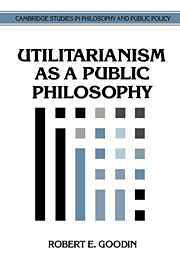Book contents
5 - Responsibilities
Published online by Cambridge University Press: 28 January 2010
Summary
Responsibilities are to consequentialistic, utilitarian ethics what duties are to deontological ones. Duties dictate actions. What responsibilities of the “task responsibility” sort advocated by utilitarians and consequentialists more generally dictate are, instead, results. Exploring the deeper similarities and differences between the two notions helps us see what is at stake, and what is not (necessarily) at stake, in the larger choice between the two different styles of ethic.
Of course deontologists do ascribe responsibility, in another sense, to agents. The sort of responsibility they are talking about is moral responsibility more generally – credit and blame for what one has done. I call this “blame-responsibility” in the chapters that follow. Utilitarian consequentialists need to ascribe to agents such credit and blame, too, if the task responsibilities they ascribe are to have any motive force. But the consequentialistic-utilitarian approach, by putting task-responsibility first and deriving moral responsibility from that, makes better sense of the way in which we actually assign credit and blame than does the deontological model, fixated as it is on motives and intentions and duty done for duty's sake.
This proposition is illustrated in the pair of chapters that follow. Chapter 6 considers the problem of ascribing credit and blame among participants whose joint contributions either overdetermine or underdetermine outcomes. Chapter 7 considers the problem of apportioning relative responsibilities for good or bad outcomes to participants in joint endeavors.
- Type
- Chapter
- Information
- Utilitarianism as a Public Philosophy , pp. 81 - 87Publisher: Cambridge University PressPrint publication year: 1995

